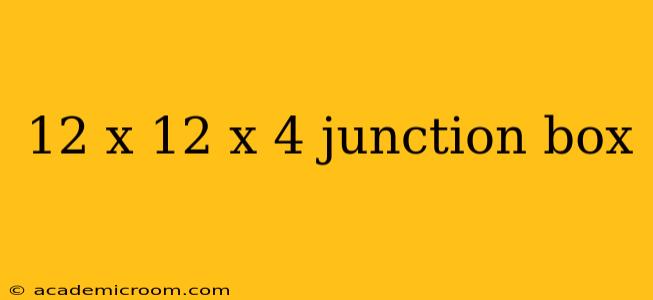Choosing the right junction box is crucial for any electrical project. A 12 x 12 x 4 inch junction box offers significant space, making it suitable for a variety of applications, but understanding its uses and limitations is key. This guide explores everything you need to know about this larger-than-average junction box.
What is a 12 x 12 x 4 Junction Box Used For?
A 12 x 12 x 4 inch junction box, due to its generous size, is typically used for projects requiring substantial wiring capacity. This might include:
- Large-scale residential projects: Think whole-house renovations or new constructions where extensive wiring is necessary.
- Commercial installations: Office buildings, retail spaces, and industrial settings often require larger junction boxes to manage the complex wiring systems.
- Outdoor applications: While requiring weatherproof seals and appropriate mounting, these boxes can handle the bulk wiring of outdoor lighting or power systems.
- Systems with multiple circuits: Their capacity is perfect for consolidating several circuits in a single, easily accessible location.
The large internal space allows for organized and safe wiring, minimizing the risk of overheating and improving maintainability. Remember that proper sizing is critical for safety and code compliance.
What are the Advantages of Using a 12 x 12 x 4 Junction Box?
Several key advantages make this size a strong contender for many projects:
- Ample Wiring Space: The most obvious benefit is the sheer amount of space for wiring, conduit, and connectors. This reduces congestion and simplifies installation and maintenance.
- Improved Organization: The extra space allows for neater wiring, improving aesthetics and making troubleshooting much simpler.
- Flexibility: Accommodates a wide range of wiring configurations and devices.
- Reduced Heat Buildup: Properly wired, the larger space promotes better airflow, decreasing the risk of overheating.
What are the Disadvantages of Using a 12 x 12 x 4 Junction Box?
While offering many benefits, consider these potential downsides:
- Size and Weight: These boxes are significantly larger and heavier than smaller ones, requiring more careful handling and potentially more robust mounting solutions.
- Cost: Larger boxes naturally cost more than smaller alternatives.
- Space Requirements: The box's size might not be suitable for all applications or locations, especially where space is limited.
How Many Wires Can Fit in a 12 x 12 x 4 Junction Box?
This question doesn't have a single definitive answer. The number of wires depends on several factors:
- Wire Gauge: Thicker wires (lower AWG numbers) occupy more space.
- Number of Conductors: Individual wires within a cable (e.g., three conductors in a 12/3 cable) increase the space needed.
- Type of Connectors: The size and shape of connectors used influence how efficiently the wires can be arranged.
- Wiring Method: Organized wiring techniques maximize space.
Always consult the National Electrical Code (NEC) and relevant local codes to determine the appropriate fill ratio for your specific wire types and installation. Using a box fill calculator can be incredibly helpful in determining the appropriate box size and avoiding code violations.
What Material Are 12 x 12 x 4 Junction Boxes Made Of?
Common materials for junction boxes include:
- Steel: Durable and robust, offering good protection.
- Aluminum: Lighter than steel but may require more careful handling.
- Plastic (PVC): Less expensive and often used for non-metallic sheathed cable.
The choice of material depends on the application's requirements and environmental conditions.
Where Can I Buy a 12 x 12 x 4 Junction Box?
12 x 12 x 4 inch junction boxes are available at various electrical supply stores, both online and in physical locations. Major home improvement retailers often carry a range of junction boxes, but for specialized needs, contacting an electrical supplier directly might be necessary. Always ensure the box meets the NEC and relevant local codes.
This guide provides a comprehensive overview of 12 x 12 x 4 inch junction boxes. Remember to consult the NEC and local electrical codes before starting any electrical project to ensure safety and compliance. Proper planning and the use of appropriate materials are crucial for successful and safe installations.
